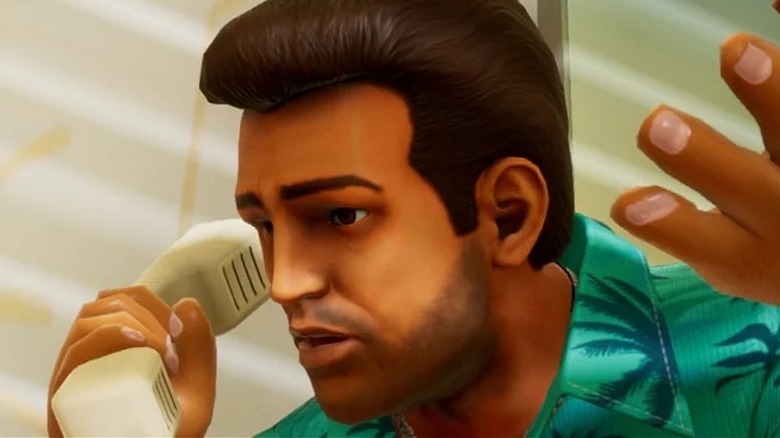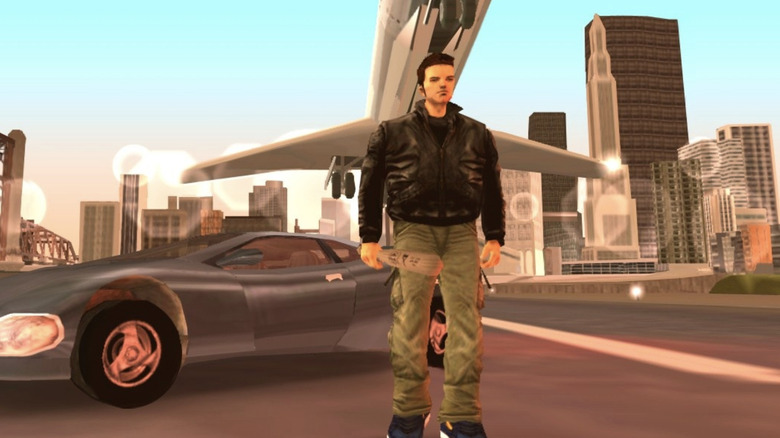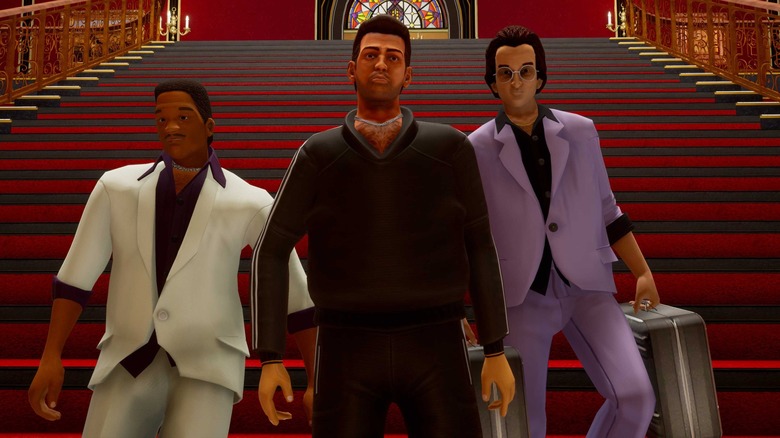Why Rockstar Won't Let The Reverse-Engineered Vice City Release
"Grand Theft Auto 3" was unlike anything gamers had ever seen before when it launched in 2001, but "Grand Theft Auto: Vice City" was a game-changer, both literally and figuratively. The title built upon the 3D open-world mayhem the series had begun to explore with its third mainline entry, but it also injected even more wacky humor and gratuitous violence — then set it all to a sweet, sweet 80s soundtrack and design aesthetic. It's no wonder that fans have been longing to revisit the title in a port upgraded for current generation hardware. And no, the remastered ports from "Grand Theft Auto: The Trilogy" don't count, as those versions of the games were extremely buggy at launch, resulting in disastrous critical reviews and scathing fan feedback.
Fans may be even more disappointed to be reminded of a pair of projects called "Re3" and "reVC," in which a fan called aap took assets from the code for "GTA 3" and "Vice City" and, along with other modders, used them to reverse-engineer remakes of both titles. Far from being a copy-paste job, these fans also made some significant improvements to the original games along the way. The updated fan-made ports included a debug menu and enchanced visuals, not to mention eliminated loading screens almost entirely. The two games apparently played like a dream — until the dream ended in 2021 with a takedown notice from Rockstar Games, stopping the project in its tracks.
These copyright notices got the rumor mill turning, with some fans believing that the only reason Rockstar asked for the project to be shuttered was so that "Re3" and "reVC" wouldn't compete with its then-upcoming remastered trilogy collection. But now that the dust is settling, why is it that the publisher is still refusing to budge on these fan remakes?
Take-Two vs. Modders
Things heated up between Rockstar's parent company, Take-Two Interactive, and the folks working on the reverse-engineered remakes when the remakes were re-uploaded a couple of times, only to receive more DMCA strikes. The publisher claimed that the remakes contained code that was derivative of Rockstar's work, which constituted a violation of copyright law. When it became clear that these modders weren't about to just walk away from the project, Take-Two sued them for copyright infringement. The subsequent official complaint from Take-Two took particular issue with the defendants' repeated attempts to distribute the remakes, even after multiple warnings.
Now, it appears the two parties are finally ready to let bygones be bygones. A court filing spotted by Rockstar news account @videotech_ shows that Rockstar and the modders are in the process of settling the case, although details of that settlement remain unclear at this time. For their own part, @videotech_ hoped the modders would not have to pay a fine, arguing, "The settlement may never be public, but I hope for the best for the team ... They had no bad intentions to cause any harm to Take-Two or the GTA Trilogy launch, nor [did] they have any knowledge of the GTA Trilogy back in early 2021."
While the battle may be over between Rockstar and these fans, things aren't looking especially hopeful for the reverse-engineered remake project as a whole. At this time, neither "Re3" nor "reVC" have been re-uploaded to GitHub — which suggests that these projects may not ever reappear, and that the modders had to promise not to distribute them again as part of the settlement.
Rockstar has to protect its bottom line
The reverse-engineered "GTA" project is far from the first time that Rockstar has dropped the DMCA hammer on a fan modder. Just last year, a successful "GTA" VR mod was shut down by the publisher with little to no explanation. However, there are a few good reasons why Rockstar continues to be so stingy with its IP — and it's mainly because it is Rockstar's IP, and no one else's.
The debate rages on over whether or not these kinds of fan-made works are deemed transformative enough. Just a few months ago, when Nintendo released "Pokémon Scarlet" and "Violet" in a buggy state, fans attempted to mod the game and smooth out some of the jankier bits. (Ironically enough, fans also tried to fix the "GTA" remastered trilogy with mods, as well.)
As attorney Tre Lovell explained to SVG back in November, video game publishers like Nintendo or (in this case) Rockstar typically want to make sure that there isn't a derivative product on the market that could potentially mislead customers into believing they're playing a legitimate product. Therefore, these publishers feel the need to "jealously guard [their] games in order to preserve the right to protect [their] intellectual property." All fan mods are subject to this kind of scrutiny from the rights-holders, and the reverse-engineered "Vice City" project, sadly, is no different.
At this time, it's unclear how this settlement will impact aap and the others who worked on the remake project. However, it seems unlikely that Rockstar and Take-Two will ever allow the release of a project that is in any way derivative of their products.



